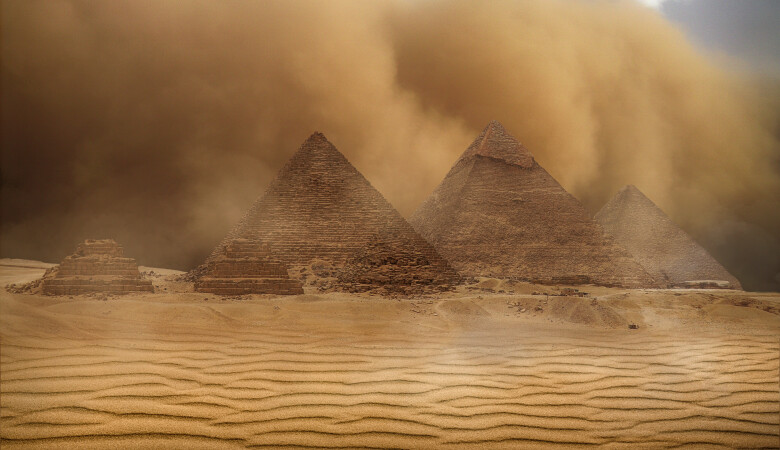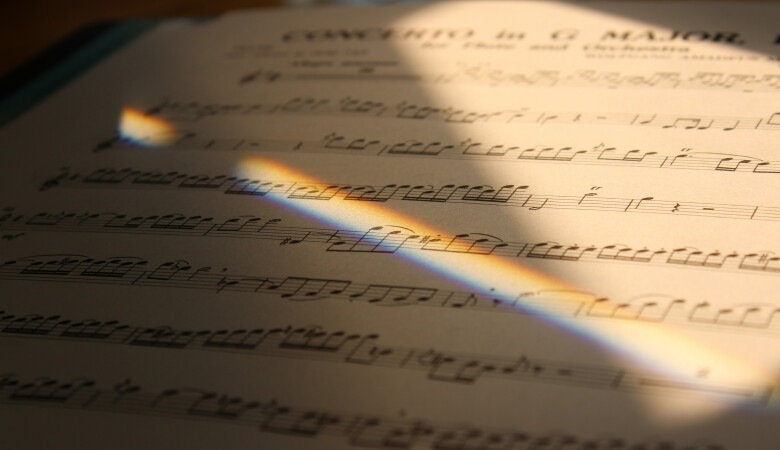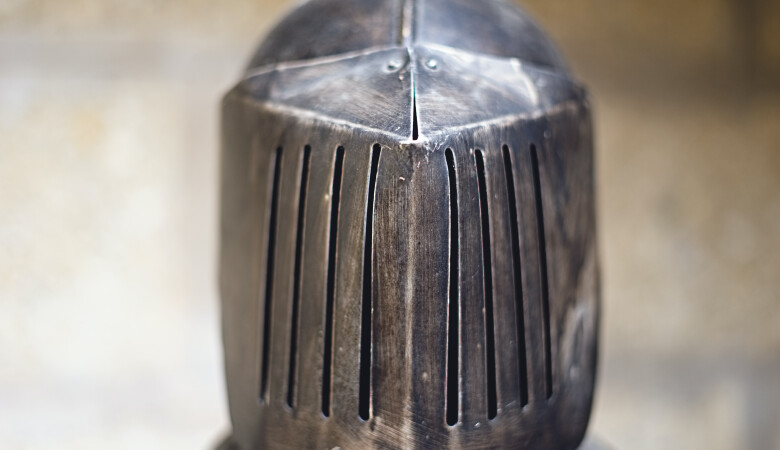Two Paths to Eternity (Isaiah Sermon 7 of 80)
June 08, 2008 | Andy Davis
Isaiah 8:1-22
Exclusivity of Christ, Sinful Nature, Providence and Sovereignty of God
Pastor Andy Davis preaches a verse by verse expository sermon on Isaiah 8:1-22. The main subject of the sermon is the two paths to eternity. One leads to everlasting light and the other to everlasting darkness.
- SERMON TRANSCRIPT -
I. The Road Not Taken
In 1916, one of the premiere poets of the 20th century, Robert Frost, was walking in the woods with a friend of his. The two of them would go frequently walking in the woods. And the friend was constantly second-guessing choices he would make in his life, even to the point of coming to a fork in the road in the woods, not knowing which way to go, then choosing one, then thinking he should go back after going one hundred yards up the road, and wanting to come back to do it again and try the other one.
And so Robert Frost wrote his most famous poem "The Road Not Taken." This what it says:
Two roads diverged in a yellow wood,
And sorry I could not travel both
And be one traveler, long I stood
And looked down one as far as I could
To where it bent in the undergrowth;
Then took the other, as just as fair,
And having perhaps the better claim,
Because it was grassy and wanted wear;
Though as for that the passing there
Had worn them really about the same,
And both that morning equally lay
In leaves no step had trodden black.
Oh, I kept the first for another day!
Yet knowing how way leads on to way,
I doubted if I should ever come back.
I shall be telling this with a sigh
Somewhere ages and ages hence:
Two roads diverged in a wood, and I—
I took the one less traveled by,
And that has made all the difference.
Now Robert Frost called that a tricky poem because it seems to espouse independence, going the way that no one else goes. He actually says it's not that at all. But frankly, he doesn't say what difference it made. Could be good, it could be bad, we really don't know. What he is saying is, "You have to make a choice."
Another poet, not so famous and not so schooled in his letters, Yogi Berra, put it this way, "When you arrive at a fork in the road, take it." Well, I don't think that's going to help us much. But Jesus spoke, I think far more poignantly, of two different roads, and of a choice we all must make. And those roads end up at eternal destinations, and it makes a huge difference which road you take. And somewhat like Robert Frost's poem, in eternity, in the future, you will look back on that decision. I really believe both those in heaven and those in hell will think much on what they did with Christ, and what road they took in the end.
II. Two Paths to Eternity
Christ’s Clarity: Two Different Roads, Two Different Eternities
He spoke of this very plainly in Matthew 7:13-14. He said, "Enter through the narrow gate. For wide is the gate and broad is the road that leads to destruction, and many enter through it. But small is the gate and narrow the road that leads to life, and only a few find it." Two different roads that you can be on, two different destinies, two different destinations, both of them eternal. One of them heaven and the other one hell.
So Also Isaiah: Two Ways Woven Together
And so also, here in Isaiah 8, I believe we see these two ways woven together in the text, side by side, running through the last two-thirds of this chapter. Look at verse eleven. He speaks of it there. "The Lord spoke to me with his strong hand upon me, warning me not follow the way of this people." He is really speaking there of a way he should not follow, and then one that he should. And this morning I want to unravel those two different ways - what I'm going to call the way of light and the way of darkness - and describe them to you. But they are woven together side by side in the text. And that is somewhat appropriate, isn't it? Because that's the way it is in our everyday life as well. The children of God and the children of the devil live their lives side by side, and in many ways their lives look very, very similar to each other.
In the parable of the wheat and the tares both grow up together, intermixed, their root systems seemingly competing for the same soil. If you pull up the wheat, you may root up the weeds with them. If you pull up the weeds, you may root up the wheat. They are just totally intertwined and only on judgment day can they be unraveled. But we must be clear now, in our minds, about what road we're on. We must know whether we are on the road of light or on the road of darkness, whether we're heading for heaven or hell. We must know. And God gives us many indications so that we can know.
In the end, we learn from scripture, there is really only one way to eternal life. Jesus doesn't merely point the way, teach the way, display the way. He is the way. John 14:6, “I am the way and the truth and the life. No one comes to the Father, except through me.”
III. Terrifying Context: Assyria Invades the Region
Now, what is the context here in Isaiah 8? Well, as always, there is something going on in history, and God is using those current events to bring these spiritual issues to the fore. How deceived are the people of this world who think current events are the real deal, that they are the issue of life? They aren't. What is going on in the hearts of men and women? That is the real deal, what they are doing with Christ. That's it.
Phase 1: Assyria Comes to “Deliver” Judah
But there are historical issues going on, and so it has to do, again as we saw in chapter seven, with Assyria. Now the context, you remember from chapter seven, is that these two smaller kingdoms of Israel (the northern kingdom of Israel, the ten tribes), and Aram were allying themselves together against the small southern kingdom of Judah. And that was a big problem for a faithless king Ahaz and his people. They were afraid they were going to get wiped out. There was going to be a conspiracy between these two kings, and they were going to topple Ahaz and the Davidic king. And they were going to set up another puppet king and rule over Judah. That's what the plan was. That's the context.
Now Isaiah, in chapter seven, had warned them not to fear, not to do anything stupid, not to do anything foolish, but to trust in the Lord and not be like a fluttering leaf. But Ahaz refused this, and he actually sent for the King of Assyria to come and help him. He sent envoys, and he sent money, and he asked for the king of Assyria to come help him. Remember the analogy we used, like a small mouse facing two larger mice or two rats? Afraid he is going to be devoured, he sends for the alley cat. "Please come and help me." And the alley cat is more than happy to come and devour the two rats. And then what? To turn on the mouse.
So phase one is Assyria comes to deliver Judah. And so Isaiah, the prophet, wants to give a message to Judah concerning these current events. And he gives them a mysterious message. It's given twice. First, it is written on a large scroll. And second, it is connected with a son that he and his wife (he calls her "The prophetess”), have. The first is written. Look at verse one. “The Lord said to me, 'Take a large scroll and write on it with an ordinary pen: Maher-Shalal-Hash-Baz.'” The translation is, "Quick to the plunder, swift to the spoil." "Write those words out, so that everyone can read them. Just write that symbolic message out."
Then there is this baby boy with the same name, Maher-Shalal-Hash-Baz, born to Isaiah and his wife. And the boy is like that boy Immanuel. Maybe he is the same boy with two different symbolic names. He says later in this chapter, "Here am I, and the children the Lord has given me. We are signs and symbols" (verse 18). There are, perhaps, two different children, and there is this symbolic name. But the same issue, both in chapter seven and in chapter eight, is of a ticking clock, a prophetic clock. And so he says in verse four, "Before the boy, [Maher-Shalal-Hash-Baz,] knows how to say, ‘My father" or ‘My mother,’ the wealth of Damascus and the plunder of Samaria will be carried off by the king of Assyria.” So before the boy can say, literally in Hebrew, "abbi" or "immi." That is "My father, my mother."
Not remembering child development like I should, I asked my wife, "Now, when does this happen?" She said, "You have five children." I can say this - she's not here. But she was, "Somewhere between the first and the second year, they begin saying things. Okay, you remember?" I didn't remember but I knew she would, so I asked her. And so within one or two years, these two kingdoms are going to be destroyed. And here comes phase one: Assyria comes to deliver Judah by destroying these two kingdoms.
Phase 2: Assyria Comes to Destroy Judah
But then comes phase two. Now the ravenous cat turns on the little mouse, and Assyria comes to destroy Judah. And the reasons are given, but we'll get to what Assyria's reasons were in chapter ten. They had their reasons. But God has his reason for bringing Assyria, and the reasons are given right in this text: what they (Judah) rejected, and what they rejoiced in. That's why he is bringing Assyria.
Now look what it says in verse six. "Because this people has rejected the gently flowing waters of Shiloah." What does that refer to? Well, I believe that these gently flowing waters are being contrasted with the mighty flood waters of the king of Assyria, the River. This is “the king of Assyria with all of his pomp” and his power (verse seven). Ahaz and his people are easily overawed by Assyria. They are impressed by Assyria's power, by their military strength. They are impressed and they reject these gently flowing waters of Shiloah.
Now Shiloah was a little tributary stream coming from the Gihon river which carried, by a small aqueduct, the water for the city of Jerusalem. It gathered in a pool there, the Pool of Siloam. It is mentioned a number of other times. In the New Testament it is where the man born blind washed the mud off when Jesus healed him. And these people, therefore, are rejecting God's provision for them. God provides enough. He speaks quietly. You know, as in the still, small voice. It's not spectacular, but he is there sustaining, loving, comforting.
People didn't want it. They wanted something spectacular. They wanted deliverance by Assyria. They rejected God, really. What did they rejoice in? Well, they rejoiced over Rezin and the son of Remaliah. The Hebrew word implies great exaltation, a shout of elation and triumph. These are the two kings that are allied against them. Why are the people of Judah so excited? Why are they celebrating? Well, because these two kings are getting destroyed. They are getting judged by God.
I believe it refers to gloating sinfully over the demise of dreaded foes. There is a German word, 'schadenfreude,' which means delight in somebody else's misfortune. And the more I meditate on this theme, the bigger it seems to me to be in popular American culture. We swim in a sea of schadenfreude. We love it when other people have trouble. I don't know how YouTube would make it without it. Somebody makes a mistake, somebody says something they ought not to, somebody slips in a speech, somebody says something foolish in a beauty pageant, and for the next three months that person has to relive it. A million hits, one after the other. Or even a political figure, somebody that we don't want to see become president, or something like that. And there is some event that hinders greatly their candidacy, and there is a delight in it. I think the local news feeds on it. Something happens, and I don't know how Jay Leno and David Letterman would make it without this kind of stuff. Something happens, and pretty soon it is fodder for the evening comedy routine.
But God hates it. Now, why does he hate it? Because it means we don't understand ourselves properly. We are not looking properly at ourselves. It is the exact opposite of, "There, but for the grace of God, go I." I deserve worse. We deserve that and worse. Jesus dealt very forthrightly with this issue, very forthrightly, that we should not gloat over the misfortune of an enemy. We should instead say, "I deserve this. I deserve it." Unless we repent, we will all likewise perish. More on that in a moment. But the book of Proverbs says this, Proverbs 24:17, "Do not gloat when your enemy falls; when he stumbles, do not let your heart rejoice." And Proverbs 17:5 says, "Whoever gloats over disaster will not go unpunished."
Job, in his defense of his own godly lifestyle, rejected schadenfreude, delight in an enemy's misfortune. He said this in Job 31:29: “If I have rejoiced at my enemy's misfortune or gloated over the trouble that came to him, [then…]” In effect, he said, "May I be cursed." It's especially evil when you realize the son of Remaliah was the last king of Israel, the northern ten tribes, and they are being evicted from the promised land because of idolatry. What is there to gloat about in that? The people of Judah should have been weeping. These were the sons and daughters of Abraham, and from the very beginning of that northern kingdom they turned away to idolatry. There should have been brokenness. There should have been sackcloth and ashes. There should have been weeping and sadness and repentance and a looking inward.
Because of these things, what the people rejoiced in and what the people rejected, Assyria is coming to destroy Judah as well. Look at verses seven and eight. "Therefore, [because of this], the Lord is about to bring against them the mighty flood waters of the River - the king of Assyria, with all of his pomp. It will overflow all its channels, run over all its banks and sweep on into Judah, swirling over it, passing through it and reaching up to the neck. Its outspread wings will cover the breadth of your land, O Immanuel!" Here it the prophecy: Assyria is coming for you too, oh gloating Judah. Assyria is coming like a river that overflows its banks. This is very poignant, because the promised land was to the northern extent of the river. That's as far as the promised land went. Well, the Assyrians are coming over that river. They are coming down into the promised land. They are going to take it over.
And note also the accuracy of the prophecy. I love this. Verses 7 and 8, "It will overflow all its channels, run over all its banks and sweep on into Judah, swirling over it, passing through it and reaching up to the neck." You get the picture of a man whose legs are trapped. And he is in a flood. And the flood is getting higher and higher, and he can't get his legs out. He's stuck there, and the water just gets higher, and higher, and higher. It's like one of those submarine movies. Have you ever seen that? And I start to breathe. But the waters are getting higher and it goes right up to the neck. Almost dead, but not quite. The accuracy.
Phase 3: Assyria comes to Be Destroyed in Judah
Phase three: Assyria comes into Judah to be destroyed. We will get to this later in the book of Isaiah. But you know what happened, how godly Hezekiah spread out the letter from the king of Assyria, and how the Lord sent out one angel, and 185,000 Assyrian troops were dead, like that. So Assyria is going to be destroyed. Those are the three phases. That is the context. And why? Because God is with us, because of Immanuel. That's what he says. Look at verses nine and ten. "Raise the war cry, you nations, and be shattered! Listen, all you distant lands. Prepare for battle, and be shattered! Prepare for battle, and be shattered! Devise your strategy, but it will be thwarted; propose your plan, but it will not stand, for God is with us." He is referring to Assyria here. So Assyria can make their plans. They can come in, but they cannot extinguish the people of God, because God is with them.
God With “Us”… But Who is “Us”?
Now in the rest of the chapter he is going to define what 'us' God is with. Who are the people God is saving? Clearly, he is sweeping away the northern ten tribes, with most of them dead. Many of the southern tribe of Judah are going to be killed as well by the Assyrian invasion. But God has his eye on the remnant and he has his eye on the future. He wants to define the people of God. He wants to describe what kind of life it is that he is giving. And so in the rest of the chapter we see these two ways intricately woven together, the way of light and the way of darkness, so that we may know what he works in a people whom he saves, so that we may know whether we are among them.
IV. The Way of Light
A Life In God’s Strong Grip
He describes it and he starts with this: it is a life in the strong grip of the sovereign God. Verse eleven, "The Lord spoke to me with his strong hand upon me, warning me not to follow the way of this people." So the way of life begins with the sense of the hand of almighty God plucking you as one rescued from the fire, a sense that God is with you, plucking you from the highway of hell. "His strong hand upon me." That is God's. He has taken hold of Isaiah as a prophet. But I believe that Isaiah also represents the elect, the people of God. And he takes hold of his elect and he will not let them go. They are secure in his grip, praise God. They will most certainly be saved, and not because of their own striving and effort, but because God is mighty, and he will not let us go.
John 10:27-30 says, “My sheep listen to my voice; I know them, and they follow me. I give them eternal life, and they shall never perish; no one can snatch them out of my hand. My Father, who has given them to me, is greater than all; no one can snatch them out of my Father's hand. I and the Father are one.” One in what? Well, one at least in this, in holding onto the sheep with the sovereign power of God. That is where it starts, with God taking hold of you. And he will not let you go.
A Life Listening to God’s Word… and Warnings
Secondly, it is a life of listening to God's word and heeding his warnings. The people of God, those who are on that narrow road that leads to life, listen to God's word and heed his warnings. Look at verse eleven. “The Lord spoke to me, you see, with his strong hand upon me, warning me not to follow the way of this people. He said…,” etcetera. He's listening. He's listening. Now Isaiah is a prophet. He hears God speak to him. He hears God's promises. He takes seriously God's warnings. And this is the essence of the way of life. John 10:27 again, "My sheep listen to my voice… they follow me." It is a way of listening to Christ as he speaks.
A Life Apart from the Crowd
Number three, it is a life apart from the crowd, apart from that broad road that leads to destruction. Most people are traveling on it. This is a life apart from that. Look at verse eleven. "The Lord spoke to me with his strong hand upon me, warning me not to follow the way of this people." Don't go their way. It's a way that leads to destruction. At some point, a person says, "I'm not going to do that anymore." And they break with people who are going the wrong way. They break up those relationships. They don't do those things anymore. They stand up under ridicule. They just break off and go a separate way. God calls Isaiah and all of us away from a lifestyle of the crowd. Isaiah was not to look at the threat of Israel and Aram the same way that the lost people do. He is not to look at the invasion of Assyria the same way they do. He's to see everything differently. He's to see God behind all of it. It is a life of separation, a life apart from the crowd. “‘Therefore come out from them and be separate,’ says the Lord. ‘Touch no unclean thing and I will receive you.’” (2 Corinthians 6:17).
A Life of Fearlessness… and Fear
Fourthly, it is a life of fearlessness and fear. For me, theologically, I'll reverse them. First, one kind of fear, and then fearlessness. Let me say directly, fear the Lord and you need fear nothing else. If you don't fear the Lord, you must fear everything else, because God is sovereign, and everything is in his hands, and he can do anything he wants. If you fear the Lord, you need fear nothing else, for God is your loving Father. And he will care for you through some of the most horrendous trials. He will be with you and take you through, into his presence. You need fear nothing else. Look what he says here in verse twelve and thirteen. “Do not call conspiracy everything that these people call conspiracy; do not fear what they fear, and do not dread it. The Lord Almighty is the one you are to regard as holy, he is the one you are to fear, he is the one you are to dread.” This is the focus here: do you fear God? Do you fear the one who sits high and lifted up on his throne, and the train of his robe fills the temple? And the seraphim are covering their faces before him, because they can't look at his full glory. They are the ones who are calling out, “Holy, holy, holy is the Lord Almighty.” Do you fear him? Do you fear what he thinks, what he can do? Do you realize what omnipotence is? Do you fear God? Well, if so, you need fear nothing else. Nothing else.
And don't worry about conspiracy theories. I know some people who spend a ton of time working on conspiracy theories. One world government… That actually freaked me out. I got onto a plane and there was this sign, “One World Airline,” or something like that. I was like, "I don't know. Should I get on the plane?" I just laughed. I said, "Well, I'm in the hand of God. I can get on a One World Alliance airplane. It's okay. It's not the antichrist airplane, not yet anyway." But let me tell you something. I believe there is an intelligent, malevolent conspiracy being formed to seek to take over the world. And I think Satan is running it, and I think he has been for two thousand years. And I believe with all my heart it will break into space and time, and the antichrist will reign. It is all going to happen. I'm not afraid of it. It's been predicted. It's going to come. And the One who will reign over the earth, the Lord Jesus Himself will overthrow with the breath of his mouth and slay with the sword coming out of his mouth, with the splendor of his glory. What do we need to fear? Fear Christ. Fear him and you need fear nothing else.
Don't worry about conspiracies and all that. There is one. It's coming in all kinds of kaleidoscopic aspects and it's happening. Don't sweat it. Focus instead on the kingdom of God. Jesus put it this way, very plainly in Matthew 10:28, “Do not be afraid of those who kill the body but cannot kill the soul. Rather, [I'll tell you who to fear,] be afraid of the One who can destroy both soul and body in hell.” That's God. You fear him, you need fear nothing else. I think too many Christians live in constant fear of people. Proverbs 29:25 says, “Fear of man will prove to be a snare, but whoever trusts in the Lord is kept safe.” Many of you would be far more fruitful evangelistically if you feared people less and feared God more. I know the same is true of me. John Wesley put it this way: "Give me one hundred preachers who fear nothing but sin, and desire nothing but God, and I care not a straw whether they be clergymen or laymen. Such alone will shake the gates of hell and set up the kingdom of heaven on earth" - John Wesley.
A Life Resting in the True Sanctuary
Fifth, it's a life of resting in the true sanctuary. Verses thirteen and fourteen say, "The Lord Almighty is the one you are to regard as holy, he is the one you are to fear, he is the one you are to dread, and he will be a sanctuary." That's a safe place, a place of security. "With salvation's walls surrounded, thou may’st smile at all thy foes," says the hymnist John Newton. Isn't that beautiful? Just stand there up on the sure and solid wall of salvation and you need fear nothing else. The Lord is your sanctuary.
Proverbs 18:10 says, "The name of the Lord is a strong tower; the righteous run to it and are safe." The New Testament version of that is Romans 10:13, "Everyone who calls on the name of the Lord will be saved." We flee to Christ, to Christ crucified, to the one who shed his blood on the cross, and he is the sanctuary from wrath. He is the one that we come to and he will save us. He will protect us and nothing can touch us.
A Life in the Written Word
Number six: this life is a life in the written word. We do not for the most part, like a prophet, hear God speaking directly. We have the indwelling spirit, but there is a distinction there. What we have are the words of the prophets written down. "We have the word of the prophets made more secure certain," it says in 2 Peter 1:19. We have the written word, and we have access to it. And so verse one says, "The Lord said to me, 'Take a large scroll and write on it with an ordinary pen.' " He commanded his prophets to write it down so that it might be for future generations. Verse sixteen, "Bind up the testimony and seal up the law among my disciples." Do you see that? This is about the written word.
Verse twenty, “To the law and to the testimony! If they do not speak according to this word, they have no light of dawn.” So as long as this church remains, long after I'm gone, if the Lord tarries, you must get a man of God who will speak only according to this word. Because if they don't speak according to this word they have no light to give you. It is a life immersed in the written word of God. And the centerpiece of that word is Christ. 2 Timothy 3:15 says, "The holy Scriptures… are able to make you wise for salvation through faith in Christ Jesus." The scripture is always pointing to Christ, pointing to Christ. I can't preach a single chapter in Isaiah without mentioning Christ crucified. It's always pointing to Christ. He is the sanctuary.
A Life Inquiring of God
Seventh, it is a life inquiring of God. “When men tell you to consult mediums and spiritists, who whisper and mutter, should not a people inquire of their God?” (verse 19). Now that's prayer. Go to God and ask. Seek his face. Ask him what to do. Ask God for advice. Say, "Lord, I don't know what to do." “If any of you lacks wisdom, he should ask God, who gives generously to all without finding fault, and it will be given to him. But when he asks, he must believe and not doubt, because he who doubts is like a wave of the sea, blown and tossed by the wind” (James 1:5,6). And so we go and we ask. It is a life inquiring of God.
As I read this what comes in my mind is faithless King Saul who didn't inquire of the Lord at all. And at the end of his life he is going to a medium, the witch at Endor, and asking for something. We'll get back to him in a moment. But instead, we've got David, the man after God's own heart, and he is asking, "Should I do this?" And the Lord answers. "Should I do that?" And the Lord gives him insight, and he is inquiring of the Lord. It is a life of prayer, based on the word of God.
Ultimately: A Life of Faith in the Lord
And then eighth, ultimately, it is a life of faith in the Lord. Verse seventeen, “I will wait for the Lord, who is hiding his face from the house of Jacob. I will put my trust in him.” That is speaking of adverse circumstances, of trials. I don't know what he is doing. Like Habakkuk saying, "I don't know what you're doing, God, in my life. I don't know what you're doing in history, but I am going to wait for you. I am going to put my trust in you. And I believe, in the end, all things will be clear." It is a life, ultimately, of trust, of faith.
That is a description, not exhaustive, but from Isaiah 8, of the life that leads to eternal life. It is the life of light.
V. The Way of Darkness
A Life Spent Rejecting God’s Gentle Provision
What about the way of darkness? Well, first it is a life spent rejecting God's gentle provision. I already gave this to you in the context section, but these people didn't want the gently flowing waters of Shiloah. They are not interested in the still, small voice. They want something more spectacular, something more dramatic, and so they reject God. Jeremiah 2:13, “My people have committed two sins: They have forsaken me, the spring of living water, and have dug their own cisterns, broken cisterns that cannot hold water.” And this rejection, friends, is no accident. They have no taste for God. They don't want that. It is a willful choice to hear the grace of God and turn away empty. They don't want it.
A Life of Rejoicing While Others Suffer Judgment
Secondly, the way of darkness is a way of rejoicing when others suffer judgment. We already talked about this - schadenfreude. “Because this people has rejected the gently flowing waters of Shiloah and rejoices over Rezin and the son of Remaliah" (verse 6). They enjoy seeing their enemies fall. This is a great sin. It's cold. It's loveless, delighting in somebody else's downfall. But worse than that, as I've already mentioned, it means you don't know yourself. You don't know who you are apart from Christ.
We see some criminal at Enron go down, and we justify ourselves, saying, "We wouldn't do that." Some athlete cheats and uses performance enhancing drugs. "We would never do something like that." Some governor gets caught with a high-priced prostitute. "We would never do anything like that. He deserves what he got." This self-righteousness is the enemy of your soul. We don't know who we are. And as I said, Jesus told us very plainly in Luke 13 what we should think when we see disaster come upon someone. Some were gloating over some Galileans, whose blood Pilate had mixed with their sacrifice. You remember that? And they said, "They must have been terrible sinners." And Jesus said, "Do you think that these Galileans were worse sinners than all the other Galileans…? I tell you, no! But unless you repent, you too will all perish" (Luke 13:2,3). And regarding the ones who died when the tower of Siloam fell down, we have the same word here in Isaiah 8, the same thing. A tower fell down and a bunch of people died in that urban tragedy. And he said the same thing, "I tell you, no! But unless you repent, you too will all perish" (Luke 13:5). We all have to hear that. And I tell you, the way of light hears that and takes that seriously. But the way of darkness blows that off. We always think it is somebody else, the sinners out there.
A Life of Stumbling Over God… and Being Snared by Him
Number three, it is a life of stumbling over God and being snared by him. Verses fourteen and fifteen, “But for both houses of Israel he, [the Lord Almighty], will be a stone that causes men to stumble and a rock that makes them fall. And for the people of Jerusalem he will be a trap and a snare. Many of them will stumble; they will fall and be broken, they will be snared and captured.” Now God was meant to be a sanctuary. But if he will not be a sanctuary he will be a snare. If he will not be a rock on which you build your life, he will be a rock on which you stumble and that will crush you. He will be friend or he will be a foe. He will be savior or he will be judge. He is going to be something in your life. And so in the way of darkness he is a snare. He is a stumbling block. They especially stumble over Christ, as I will say at the end. Christ is especially offensive to those on the way of darkness.
A Life of False Spiritual Guidance
Fourthly, it is a life of false spiritual guidance. Verses nineteen and twenty, “When men tell you to consult mediums and spiritists, who whisper and mutter, should not a people inquire of their God? Why consult the dead on behalf of the living? To the law and to the testimony! If they do not speak according to this word, they have no light of dawn.” People are desperate for spiritual guidance. They want a word from the supernatural realm. Why? Because they fear the future. They don't know the future, and so they want to know the future. So they go to mediums and spiritists. Does this happen now, even now in the 21st century? Yes, it does. People want to know the future, even at the low level of horoscopes, up to just immersing themselves in the occult, in Ouija boards and all kinds of stuff. They want to know.
And those mediums and spiritists whisper and mutter, and gaze into crystal balls and make bizarre pronouncements, and channel spirits and conjure up ghosts of long dead relatives to give spiritual guidance. But no guidance comes. You know why? Because the wicked dead are too busy screaming in agony to give any advice. And there is a chasm that they can't cross, and they can't come over and say anything. And the righteous dead are in the presence of the Lord, gazing at his beauty, and knowing, as Abraham did in that story that Jesus told, that the word of God is enough. They don't need any more than that. Instead, it is the demons who are impersonating the dead, fooling and tricking people into that way of life.
A Life of Spiritual Famine and Restless Roaming
Fifth, it is a life, therefore, of spiritual famine and restless roaming. Verse twenty-one, “Distressed and hungry, they will roam through the land; when they are famished, they will become enraged and, looking upward, will curse their king and their God.” Having rejected the gently flowing waters of Christ, they are thirsty with a raging thirst. Having rejected the living bread, which is Christ, they are famished. They are abused by demonic forces, harassed and helpless, totally at the mercy of demons who have no mercy. And they become demonic themselves, interestingly.
Hungry for wisdom, hungry for guidance, hungry for a touch from God, hungry for love, hungry for purpose in life, they roam around through life looking for it, much as Jesus described demons, when they come out of a man. Matthew 12:43, “When an evil spirit comes out of a man, it goes through arid places seeking rest and does not find it.” They are restless beings. They say, "Well, I'll go back to the house I left." So they go back. Or like Satan in Job 1:7, “The Lord said to Satan, ‘Where have you come from?’ Satan answered the Lord, ‘From roaming through the earth and going back and forth in it.’” And it is so sad to see the roaming of lost people, who are on the road to destruction, hungry for something, feeding it with sex, and drugs, and entertainment, and success, and materialism. And they are feeding, and nothing satisfies. They are just so hungry. They are looking for something. And all of these excursions - it's like drinking salt water. It just leaves you with an even more raging thirst.
A Life of Rage and Cursing
And therefore it is a life, number six, of rage and cursing. Verse twenty-one, “Distressed and hungry, they will roam through the land; when they are famished, they will become enraged.” Do you see that? Famished, they are enraged. “And, looking upward, will curse their king and their God.” They are going to curse God because of their hunger. It is so strange how they think. If they would just accept God's gracious provision, they would find everything that they need in him. But instead they end up enraged and cursing God.
And again, how like Satan are they? Think about Revelation 12:12, when it says, “Woe to the earth and the sea, because the devil has gone down to you! He is filled with fury, because he knows that his time is short.” And so it is with lost people. They know their time is short. It does not matter how big their mansion is. It does not matter how good the quality of their food, or clothing, or their position. They only have it for a little while, and then they lose it all, and it makes them angry, actually. And they are generally angry people. Do you see the rage in our land? It is an angry country we live in. But it is not just our country. It's all over, because people don't know God. They don't know his peace. They don't know his forgiveness, and so they are angry about it.
Ultimately: A Life of Darkness Now and Eternally
Ultimately, number seven, it is a life of darkness. Spiritual darkness now, real darkness eternally. And that is a terrifying thing. That is how this chapter ends. Verse twenty-two, "They will look toward the earth and see only distress and darkness and fearful gloom, and they will be thrust into utter darkness." This is the way of darkness, fleeing from the light. They live in darkness so that their deeds cannot be exposed. The ultimate punishment then is an eternity of darkness, away from God. You see God is light. They will spend eternity away from that light. And notice the strong word ‘thrust’. "Thrust into utter darkness." It bothers me when pastors or preachers say, “God doesn't send anyone to hell. People send themselves. God, in effect, says, ‘Have what you have always wanted.’” Well, let me tell you something, that is utterly false. On judgment day, when the lake of fire is obvious and some have already been thrown in, no one is going to send themselves to hell. They will be thrust there. That's the word.
Matthew 8:12, "But the subjects of the kingdom will be thrown outside, into the darkness, where there will be weeping and gnashing of teeth." God sends people to hell because their sins were not forgiven. They never trusted in Christ. There was no forgiveness. The word 'thrust' is there. They are “thrust into utter darkness.” Matthew 25:41, “Then he will say to those on his left, 'Depart from me, you who are cursed, into the eternal fire prepared for the devil and his angels.'” That is the end of the way of darkness - complete darkness apart from God.
VI. Christ (Immanuel) the Only Way
Now Christ our Savior has come, and he can rescue people from the way of darkness, from the highway that leads to hell. He can rescue them and transfer them onto the narrow road that leads to life. He has that power. How? Because he is Immanuel. He is ‘God with us’. If God is with us, who can be against us? And how does he do it? He does it by entering life as a human being, as a baby, living a life, a physical life here on this earth. He did two thousand years ago. Tempted in every way, just as we are, yet he was without sin. He obeyed perfectly the law of God, obtaining a perfect righteousness, which he then gives us as a gift through simple faith. And all of this is taught in many, many places in the New Testament. He shed his blood on the cross so that the wrath of God might be averted, and we might not have to stand under the just punishment that we deserve. We know it. But we are free from it because Jesus drank it for us. Immanuel - God with us to save us, not to judge us.
And so the author of Hebrews, in Hebrews 2, quotes Isaiah 8 twice, and this is what he says. In Hebrews 2:11-15, “Both the one who makes men holy and those who are made holy are of the same family. So Jesus is not ashamed to call them brothers. He says, 'I will declare your name to my brothers; in the presence of the congregation I will sing your praises.' And again, 'I will put my trust in him.'” That is Isaiah 8. “And again he says, 'Here am I, and the children God has given me.'” That is Isaiah 8. Jesus speaks that. “Here I am.” Where? In heaven. "And here are my children, the ones God gave me. And I saved them all. I lost none of them, but they are all safe with me in heaven. Here am I and the children God has given me." “Since the children have flesh and blood, he too shared in their humanity so that by his death he might destroy him who holds the power of death - that is, the devil - and free those who all their lives were held in slavery by their fear of death.”
VII. Application
Understand We Are All on One of Two Roads to Eternity
That is salvation. Oh, friends, do you know him? You have to look. What road are you on? Search yourself. Search your heart. Are you on the way of light? Do you have the sense of God's grip of grace on you? Are you listening to him speak? Do you embrace his gently flowing provision for you? Are you delighted in it? Do you walk in the newness of life that Christ alone can give? Do you have the testimony of the Spirit, as you look over this list, that “these things are true of me, by his grace. They are true of me. I'm on the way that leads to life.”? If so, then praise God and keep walking. You're not done yet. By faith in Christ keep going. But if you're not, if you are in the way of darkness, oh, I urge you to flee to Christ. Flee to him now. Trust in him for the forgiveness of your sins. Amen.































